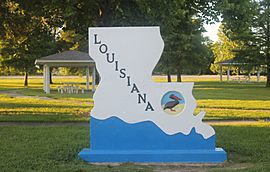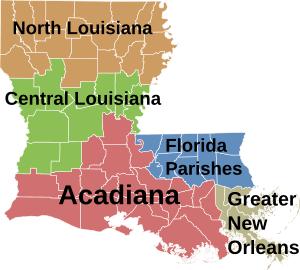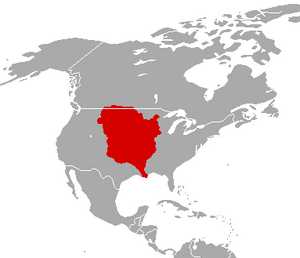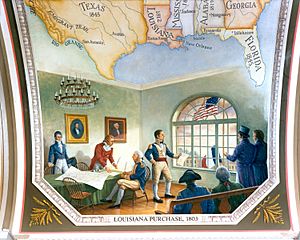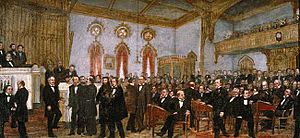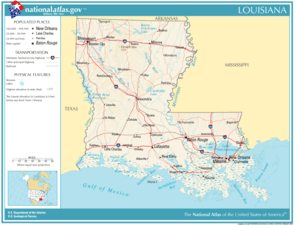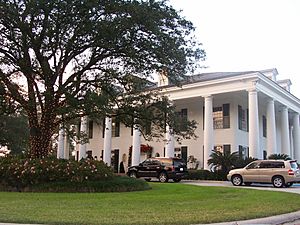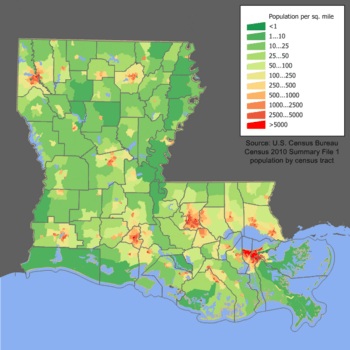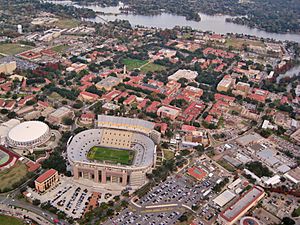Louisiana facts for kids
Quick facts for kids
Louisiana
|
|||
|---|---|---|---|
| State of Louisiana État de Louisiane (French) Estado de Luisiana (Spanish) Létat de Lalwizyàn (Louisiana Creole) |
|||
|
|||
Nickname(s):
|
|||
| Motto(s):
Union, Justice, Confidence
|
|||
Anthem:
|
|||
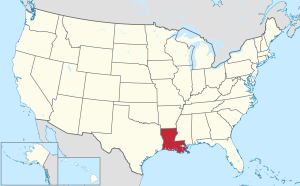
Location of Louisiana within the United States
|
|||
| Country | United States | ||
| Before statehood | Territory of Orleans and Louisiana Purchase | ||
| Admitted to the Union | April 30, 1812 (18th) | ||
| Capital | Baton Rouge | ||
| Largest city | New Orleans | ||
| Largest county or equivalent | East Baton Rouge Parish | ||
| Largest metro and urban areas | Greater New Orleans | ||
| Legislature | Legislature | ||
| • Upper house | Senate | ||
| • Lower house | House of Representatives | ||
| Judiciary | Louisiana Supreme Court | ||
| U.S. senators | Bill Cassidy (R) John Kennedy (R) |
||
| U.S. House delegation | 4 Republicans 2 Democrats (list) |
||
| Area | |||
| • Total | 52,124 sq mi (135,000 km2) | ||
| • Land | 43,204 sq mi (111,898 km2) | ||
| • Water | 8,920 sq mi (23,102 km2) 15% | ||
| Area rank | 31st | ||
| Dimensions | |||
| • Length | 379 mi (610 km) | ||
| • Width | 130 mi (231 km) | ||
| Elevation | 100 ft (30 m) | ||
| Highest elevation | 535 ft (163 m) | ||
| Lowest elevation | −8 ft (−2.5 m) | ||
| Population
(2024)
|
|||
| • Total | |||
| • Rank | 25th | ||
| • Density | 106.9/sq mi (41.3/km2) | ||
| • Density rank | 26th | ||
| • Median household income | $58,200 (2023) | ||
| • Income rank | 47th | ||
| Demonym(s) | Louisianian Louisianais (Cajun or Creole heritage) Luisiano (Spanish descendants during rule of New Spain) |
||
| Language | |||
| • Official language | None constitutionally specified; Louisiana French (special status under CODOFIL) | ||
| • Spoken language | As of 2010 | ||
| Time zone | UTC−06:00 (CST) | ||
| • Summer (DST) | UTC−05:00 (CDT) | ||
| USPS abbreviation |
LA
|
||
| ISO 3166 code | US-LA | ||
| Traditional abbreviation | La. | ||
| Latitude | 28° 56′ N to 33° 01′ N | ||
| Longitude | 88° 49′ W to 94° 03′ W | ||
| Bird | Brown pelican |
|---|---|
| Fish | Crappie |
| Flower | Magnolia |
| Tree | Bald cypress |
| Insect | Honeybee |
Louisiana (French: Louisiane [lwizjan] ; Spanish: Luisiana [lwiˈsjana]; Louisiana Creole: Lwizyàn) is a state in the Deep South and South Central regions of the United States. It borders Texas to the west, Arkansas to the north, and Mississippi to the east. Of the 50 U.S. states, it ranks 20th in land area and the 25th in population, with roughly 4.6 million residents. Reflecting its French heritage, Louisiana is the only U.S. state with political subdivisions termed parishes, which are equivalent to counties, making it one of only two U.S. states not subdivided into counties (the other being Alaska and its boroughs). Baton Rouge is the state's capital, and New Orleans, a French Louisiana region, is its largest city with a population of about 383,000 people. Louisiana has a coastline with the Gulf of Mexico to the south; a large part of its eastern boundary is demarcated by the Mississippi River.
Much of Louisiana's lands were formed from sediment washed down the Mississippi River, leaving enormous deltas and vast areas of coastal marsh and swamp. These contain a rich southern biota, including birds such as ibises and egrets, many species of tree frogs—such as the state recognized American green tree frog—and fish such as sturgeon and paddlefish. More elevated areas, particularly in the north, contain a wide variety of ecosystems such as tallgrass prairie, longleaf pine forest and wet savannas; these support an exceptionally large number of plant species, including many species of terrestrial orchids and carnivorous plants. Over half the state is forested.
Louisiana is situated at the confluence of the Mississippi river system and the Gulf of Mexico. Its location and biodiversity attracted various indigenous groups thousands of years before Europeans arrived in the 17th century. Louisiana has eighteen Native American tribes—the most of any southern state—of which four are federally recognized and ten are state recognized. The French claimed the territory in 1682, and it became the political, commercial, and population center of the larger colony of New France. From 1762 to 1801 Louisiana was under Spanish rule, briefly returning to French rule before being sold by Napoleon to the U.S. in 1803. It was admitted to the Union in 1812 as the 18th state. Following statehood, Louisiana saw an influx of settlers from the eastern U.S. as well as immigrants from the West Indies, Germany, and Ireland. It experienced an agricultural boom, particularly in cotton and sugarcane, which were cultivated primarily by slaves from Africa. As a slave state, Louisiana was one of the original seven members of the Confederate States of America during the American Civil War.
Louisiana's unique French heritage is reflected in its toponyms, dialects, customs, demographics, and legal system. Relative to the rest of the southern U.S., Louisiana is multilingual and multicultural, reflecting an admixture of Louisiana French (Cajun, Creole), Spanish, French Canadian, Acadian, Saint-Domingue Creole, Native American, and West African cultures (generally the descendants of slaves stolen in the 18th century); more recent migrants include Filipinos and Vietnamese. In the post–Civil War environment, Anglo-Americans increased the pressure for Anglicization, and in 1921, English was shortly made the sole language of instruction in Louisiana schools before a policy of multilingualism was revived in 1974. Louisiana has never had an official language, and the state constitution enumerates "the right of the people to preserve, foster, and promote their respective historic, linguistic, and cultural origins."
Based on national averages, Louisiana frequently ranks low among U.S. states in terms of health, education, and development.
Contents
Etymology
Louisiana was named after Louis XIV, King of France from 1643 to 1715.
History
Pre-contact history
Louisiana was inhabited by Native Americans for many millennia before the arrival of Europeans in the 16th century. During the Middle Archaic period, Louisiana was the site of the earliest mound complex in North America and one of the earliest dated, complex constructions in the Americas, the Watson Brake site near present-day Monroe. An 11-mound complex, it was built about 5400 BP (3500 BCE). The Middle Archaic sites of Caney and Frenchman's Bend have also been securely dated to 5600–5000 BP, demonstrating that seasonal hunter-gatherers organized to build complex constructions in present-day northern Louisiana. The Hedgepeth Site in Lincoln Parish is more recent, dated to 5200–4500 BP.
Many current place names in the state, including Atchafalaya, Natchitouches (now spelled Natchitoches), Caddo, Houma, Tangipahoa, and Avoyel (as Avoyelles), are transliterations of those used in various Native American languages.
Exploration and colonization by Europeans
The first European explorers to visit Louisiana came in 1528 when a Spanish expedition led by Panfilo de Narváez located the mouth of the Mississippi River. In 1542, Hernando de Soto's expedition skirted to the north and west of the state (encountering Caddo and Tunica groups) and then followed the Mississippi River down to the Gulf of Mexico in 1543. Spanish interest in Louisiana then faded away for a century and a half.
In the late 17th century, French and French Canadian expeditions, which included sovereign, religious and commercial aims, established a foothold on the Mississippi River and Gulf Coast. With its first settlements, France laid claim to a vast region of North America and set out to establish a commercial empire and French nation stretching from the Gulf of Mexico to Canada.
In 1682, the French explorer Robert Cavelier de La Salle named the region Louisiana to honor France's King Louis XIV.

Louisiana's French settlements contributed to further exploration and outposts, concentrated along the banks of the Mississippi and its major tributaries, from Louisiana to as far north as the region called the Illinois Country, around present-day St. Louis, Missouri.
In the 1720s, German immigrants settled along the Mississippi River, in a region referred to as the German Coast.
France ceded most of its territory to the east of the Mississippi to Great Britain in 1763, in the aftermath of Britain's victory in the Seven Years' War.
The rest of Louisiana, including the area around New Orleans and the parishes around Lake Pontchartrain, had become a colony of Spain by the Treaty of Fontainebleau (1762).
In 1800, France's Napoleon Bonaparte reacquired Louisiana from Spain in the Treaty of San Ildefonso, an arrangement kept secret for two years.
Slavery
Bienville brought the first two African slaves to Louisiana in 1708, transporting them from a French colony in the West Indies.
Starting in 1719, traders began to import slaves in higher numbers; two French ships, the Du Maine and the Aurore, arrived in New Orleans carrying more than 500 black slaves coming from Africa. Previous slaves in Louisiana had been transported from French colonies in the West Indies. By the end of 1721, New Orleans counted 1256 inhabitants, of which about half were slaves.
When the United States purchased Louisiana in 1803, it was soon accepted that enslaved Africans could be brought to Louisiana as easily as they were brought to neighboring Mississippi, though it violated U.S. law to do so.
The United States adapted Louisiana law by adding parts of US or southern state laws. The Louisiana Black Code of 1806 made the cruel punishment of slaves a crime, but masters and overseers were seldom prosecuted for such acts.
Purchase by the United States (1803)
Napoleon's ambitions in Louisiana involved the creation of a new empire centered on the Caribbean sugar trade. By the terms of the Treaty of Amiens of 1802, Great Britain returned ownership of the islands of Martinique and Guadaloupe to the French.
When the army led by Napoleon's brother-in-law Leclerc was defeated, Napoleon decided to sell Louisiana.
Thomas Jefferson authorized Robert R. Livingston, U.S. Minister to France, to negotiate for the purchase of the City of New Orleans, portions of the east bank of the Mississippi, and free navigation of the river for U.S. commerce.
By April 30, they closed a deal for the purchase of the entire Louisiana territory of 828,000 square miles (2,100,000 km2) for 60 million Francs (approximately $15 million).
Part of this sum, $3.5 million, was used to forgive debts owed by France to the United States.
Despite Federalist objections, the U.S. Senate ratified the Louisiana treaty on October 20, 1803.
By statute enacted on October 31, 1803, President Thomas Jefferson was authorized to take possession of the territories ceded by France and provide for initial governance. A transfer ceremony was held in New Orleans on November 29, 1803.
The Louisiana Territory, purchased for less than 3 cents an acre, doubled the size of the United States overnight, without a war or the loss of a single American life, and set a precedent for the purchase of territory. It opened the way for the eventual expansion of the United States across the continent to the Pacific.
Shortly after the United States took possession, the area was divided into two territories along the 33rd parallel north on March 26, 1804, thereby organizing the Territory of Orleans to the south and the District of Louisiana to the north.
Statehood (1812)
Louisiana became the eighteenth U.S. state on April 30, 1812; since the Territory of Orleans became the State of Louisiana, the District of Louisiana was simultaneously renamed the Missouri Territory. Additional land, known as the Florida Parishes, was soon annexed into the state of Louisiana on April 14, 1812.
By 1840 New Orleans had the biggest slave market in the United States, which contributed greatly to the economy. It had become one of the wealthiest cities and the third largest city in the nation. The ban on the African slave trade and importation of slaves had increased demand in the domestic market. During these decades after the American Revolutionary War, more than one million enslaved African Americans underwent forced migration from the Upper South to the Deep South, two thirds of them in the slave trade. Others were transported by their masters as slaveholders moved west for new lands.
With changing agriculture in the Upper South as planters shifted from tobacco to less labor-intensive mixed agriculture, planters had excess laborers. Many sold slaves to traders to take to the Deep South. Slaves were driven by traders overland from the Upper South or transported to New Orleans and other coastal markets by ship in the coastwise slave trade. After sales in New Orleans, steamboats operating on the Mississippi transported slaves upstream to markets or plantation destinations at Natchez and Memphis.
Secession and the Civil War (1860–1865)
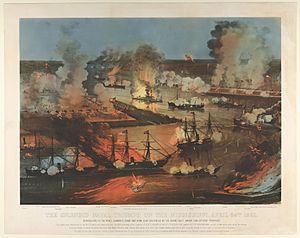
According to the 1860 census, 331,726 people were enslaved, nearly 47% of the state's total population of 708,002. Enfranchised elite whites' strong economic interest in maintaining the slave system contributed to Louisiana's decision to secede from the Union in 1861. It followed other Southern states in seceding after the election of Abraham Lincoln as President of the United States. Louisiana's secession was announced on January 26, 1861, and it became part of the Confederate States of America.
The state was quickly defeated in the Civil War, a result of Union strategy to cut the Confederacy in two by seizing the Mississippi. Federal troops captured New Orleans on April 25, 1862. Because a large part of the population had Union sympathies (or compatible commercial interests), the Federal government took the unusual step of designating the areas of Louisiana under Federal control as a state within the Union, with its own elected representatives to the U.S. Congress.
Post-Civil War (1865–)
Following the Civil War and emancipation of slaves, violence rose in the South as the war was carried on by paramilitary and private groups.
African Americans began to live as citizens with some measure of equality before the law. Both freedmen and people of color who had been free before the war began to make more advances in education, family stability and jobs. At the same time, there was tremendous social volatility in the aftermath of war, with many whites actively resisting defeat. White insurgents mobilized to enforce white supremacy.
The state population in 1900 was 47% African-American: a total of 652,013 citizens, of whom many in New Orleans were descendants of Creoles of color, the sizeable population of free people of color who had been established long before the Civil War.
In the early decades of the 20th century, thousands of African Americans left Louisiana in the Great Migration north to industrial cities for jobs and education.
Mobilization for World War II created jobs in the state. Thousands of other workers, black and white alike, migrated to California for better jobs in its burgeoning defense industry.
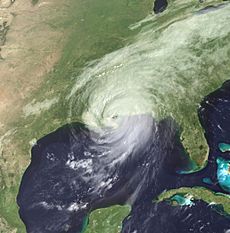
In August 2005, New Orleans and many other low-lying parts of the state along the Gulf of Mexico were hit by the catastrophic Hurricane Katrina. It caused widespread damage due to breaching of levees and large-scale flooding of more than 80% of the city. Officials issued warnings to evacuate the city and nearby areas, but tens of thousands of people, mostly African Americans, stayed behind, many of them stranded, and suffered through the damage of the widespread floodwaters.
In August 2016, an unnamed storm dumped trillions of gallons of rain on southern Louisiana, including the cities of Denham Springs, Baton Rouge and Lafayette, causing catastrophic flooding. An estimated 110,000 homes were damaged and thousands of residents were displaced.
Geography
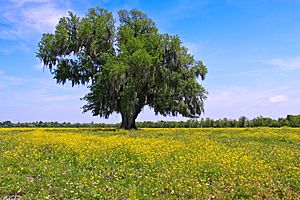

Louisiana is bordered to the west by Texas; to the north by Arkansas; to the east by the state of Mississippi; and to the south by the Gulf of Mexico. The surface of the state may properly be divided into two parts, the uplands of the north, and the alluvial along the coast.
The alluvial region includes low swamp lands, coastal marshlands and beaches, and barrier islands that cover about 20,000 square miles (52,000 km2). This area lies principally along the Gulf of Mexico and the Mississippi River, which traverses the state from north to south for a distance of about 600 miles (1,000 km) and empties into the Gulf of Mexico; the Red River; the Ouachita River and its branches; and other minor streams (some of which are called bayous).
The breadth of the alluvial region along the Mississippi is from 10 to 60 miles (15 to 100 km), and along the other rivers, the alluvial region averages about 10 miles (15 km) across. The Mississippi River flows along a ridge formed by its own natural deposits (known as a levee), from which the lands decline toward a river beyond at an average fall of six feet per mile (3 m/km). The alluvial lands along other streams present similar features.
The higher and contiguous hill lands of the north and northwestern part of the state have an area of more than 25,000 square miles (65,000 km2). They consist of prairie and woodlands. The elevations above sea level range from 10 feet (3 m) at the coast and swamp lands to 50 and 60 feet (15–18 m) at the prairie and alluvial lands. In the uplands and hills, the elevations rise to Driskill Mountain, the highest point in the state at only 535 feet (163 m) above sea level.
Besides the waterways already named, there are the Sabine, forming the western boundary; and the Pearl, the eastern boundary; the Calcasieu, the Mermentau, the Vermilion, Bayou Teche, the Atchafalaya, the Boeuf, Bayou Lafourche, the Courtableau River, Bayou D'Arbonne, the Macon River, the Tensas, Amite River, the Tchefuncte, the Tickfaw, the Natalbany River, and a number of other smaller streams, constituting a natural system of navigable waterways, aggregating over 4,000 miles (6,400 km) long.
The southern coast of Louisiana in the United States is among the fastest-disappearing areas in the world. This has largely resulted from human mismanagement of the coast (see Wetlands of Louisiana). At one time, the land was added to when spring floods from the Mississippi River added sediment and stimulated marsh growth; the land is now shrinking.
Climate
Louisiana has a humid subtropical climate (Köppen climate classification Cfa). It has long, hot, humid summers and short, mild winters. The subtropical characteristics of the state are due in large part to the influence of the Gulf of Mexico, which at its farthest point is no more than 200 miles (320 km) away.
Rain is frequent throughout the year, although the summer is slightly wetter than the rest of the year.
In the summer, the extreme maximum temperature is much warmer in the north than in the south, with temperatures near the Gulf of Mexico occasionally reaching 100 °F (38 °C), although temperatures above 95 °F (35 °C) are commonplace. In northern Louisiana, the temperatures reach above 105 °F (41 °C) in the summer.
Temperatures are generally mildly warm in the winter in the southern part of the state. The northern part of the state is mildly cool in the winter.
Louisiana is often affected by tropical cyclones and is very vulnerable to strikes by major hurricanes, particularly the lowlands around and in the New Orleans area. The unique geography of the region, with the many bayous, marshes and inlets, can result in water damage across a wide area from major hurricanes. The area is also prone to frequent thunderstorms, especially in the summer.
The entire state averages over 60 days of thunderstorms a year, more than any other state except Florida.
Louisiana averages 27 tornadoes annually. The entire state is vulnerable to a tornado strike, with the extreme southern portion of the state slightly less so than the rest of the state. Tornadoes are more common from January to March in the southern part of the state, and from February through March in the northern part of the state.
Government
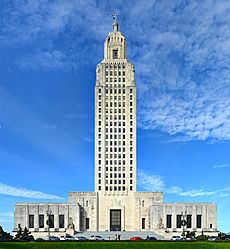
In 1849, the state moved the capital from New Orleans to Baton Rouge. Donaldsonville, Opelousas, and Shreveport have briefly served as the seat of Louisiana state government. The Louisiana State Capitol and the Louisiana Governor's Mansion are both located in Baton Rouge. The Louisiana Supreme Court, however, did not move to Baton Rouge but remains headquartered in New Orleans.
Louisiana is widely considered a Republican Party stronghold.
The Louisiana State Penitentiary, Angola is the largest maximum-security prison in the United States.
Administrative divisions
Louisiana is divided into 64 parishes (the equivalent of counties in most other states).
Most parishes have an elected government known as the Police Jury, dating from the colonial days. It is the legislative and executive government of the parish, and is elected by the voters. Its members are called Jurors, and together they elect a president as their chairman.
A more limited number of parishes operate under home rule charters, electing various forms of government. This include mayor–council, council–manager (in which the council hires a professional operating manager for the parish), and others.
Demographics
| Historical population | |||
|---|---|---|---|
| Census | Pop. | %± | |
| 1810 | 76,556 | — | |
| 1820 | 153,407 | 100.4% | |
| 1830 | 215,739 | 40.6% | |
| 1840 | 352,411 | 63.4% | |
| 1850 | 517,762 | 46.9% | |
| 1860 | 708,002 | 36.7% | |
| 1870 | 726,915 | 2.7% | |
| 1880 | 939,946 | 29.3% | |
| 1890 | 1,118,588 | 19.0% | |
| 1900 | 1,381,625 | 23.5% | |
| 1910 | 1,656,388 | 19.9% | |
| 1920 | 1,798,509 | 8.6% | |
| 1930 | 2,101,593 | 16.9% | |
| 1940 | 2,363,516 | 12.5% | |
| 1950 | 2,683,516 | 13.5% | |
| 1960 | 3,257,022 | 21.4% | |
| 1970 | 3,641,306 | 11.8% | |
| 1980 | 4,205,900 | 15.5% | |
| 1990 | 4,219,973 | 0.3% | |
| 2000 | 4,468,976 | 5.9% | |
| 2010 | 4,533,372 | 1.4% | |
| 2020 | 4,657,757 | 2.7% | |
| 2023 (est.) | 4,573,749 | 0.9% | |
| Sources: 1910–2020 | |||
The majority of the state's population lives in southern Louisiana, spread throughout Greater New Orleans, the Florida Parishes, and Acadiana, while Central and North Louisiana have been stagnating and losing population. From the 2020 U.S. census, Louisiana had an apportioned population of 4,661,468. Its resident population was 4,657,757 as of 2020. In 2010, the state of Louisiana had a population of 4,533,372, up from 76,556 in 1810.
Despite historically positive trends of population growth leading up to the 2020 census, Louisiana began to experience population decline and stagnation since 2021, with Southwest Louisiana's Calcasieu and Cameron parishes losing more than 5% of their populations individually. Experiencing decline due to deaths and emigration to other states outpacing births and in-migration, Louisiana's 2022 census-estimated population was 4,590,241.
According to immigration statistics in 2019, approximately 4.2% of Louisianians were immigrants, while 2% were native-born U.S. citizens with at least one immigrant parent. The majority of Louisianian immigrants came from Honduras (18.8%), Mexico (13.6%), Vietnam (11.3%), Cuba (5.8%), and India (4.4%); an estimated 29.4% were undocumented immigrants. Its documented and undocumented population collectively paid $1.2 billion in taxes. New Orleans has been defined as a sanctuary city.
The population density of the state is 104.9 people per square mile. The center of population of Louisiana is located in Pointe Coupee Parish, in the city of New Roads. According to HUD's 2022 Annual Homeless Assessment Report, there were an estimated 7,373 homeless people in Louisiana.
Race and ethnicity
| Race and ethnicity | Alone | Total | ||
|---|---|---|---|---|
| White (non-Hispanic) | 55.8% |
|
58.7% |
|
| African American (non-Hispanic) | 31.2% |
|
32.6% |
|
| Hispanic or Latino | — | 6.9% |
|
|
| Asian | 1.8% |
|
2.3% |
|
| Native American | 0.6% |
|
1.9% |
|
| Pacific Islander | 0.04% |
|
0.1% |
|
| Other | 0.4% |
|
1.1% |
|
Several American Indian tribes such as the Atakapa and Caddo were the primary residents of Louisiana before European colonization, concentrated along the Red River and Gulf of Mexico. At the beginning of French and Spanish colonization of Louisiana, white and black Americans began to move into the area. From French and Spanish rule in Louisiana, they were joined by Filipinos and Germans, both slave and free, who settled in enclaves within the Greater New Orleans region and Acadiana.
By the 19th and 20th centuries, the state's population fluctuated between white and black Americans; 47% of the population was Black or African American in 1900. The Black or African American population declined following migration to states including New York and California in efforts to flee Jim Crow regulations.
At the end of the 20th century, Louisiana's population has experienced diversification again, and its non-Hispanic or Latino American white population has been declining. Since 2020, the Black or African American population have made up the largest non-white share of youths. Hispanic and Latino Americans have also increased as the second-largest racial and ethnic composition in the state, making up nearly 7% of Louisiana's population at the 2020 census. As of 2018, the largest single Hispanic and Latino American ethnicity were Mexican Americans (2.0%), followed by Puerto Ricans (0.3%) and Cuban Americans (0.2%). Other Hispanic and Latino Americans altogether made up 2.6% of Louisiana's Hispanic or Latino American population. The Asian American and multiracial communities have also experienced rapid growth, with many of Louisiana's multiracial population identifying as Cajun or Louisiana Creole.
At the 2019 American Community Survey, the largest ancestry groups of Louisiana were African American (31.4%), French (9.6%), German (6.2%), English (4.6%), Italian (4.2%), and Scottish (0.9%). African American and French heritage have been dominant since colonial Louisiana. As of 2011, 49.0% of Louisiana's population younger than age 1 were minorities.
Religion
| Religion in Louisiana (2020) | ||||
|---|---|---|---|---|
| Religion | Percent | |||
| Protestant | 53% | |||
| Catholic | 22% | |||
| Other Christian | 1.5% | |||
| Unaffiliated | 19% | |||
| Jewish | 1% | |||
| Other faith | 4% | |||
Christians made up 84% of the adult population in 2014, making Louisiana one of the most predominantly-Christian states in the United States; at the 2020 Public Religion Research Institute study, 76.5% of the total adult population were Christian. In 2010, the largest Christian denominations by number of adherents were the Catholic Church with 1,200,900; Southern Baptist Convention with 709,650; and the United Methodist Church with 146,848. Non-denominational Evangelical Protestant churches had 195,903 members.
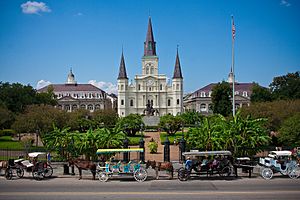
As in other southern U.S. states, the majority of Louisianians, particularly in the north of the state, belong to various Protestant denominations, with Protestants comprising 57% of the state's adult population at the 2014 Pew Research Center study, and 53% at the 2020 Public Religion Research Institute's study. Protestants are concentrated in North Louisiana, Central Louisiana, and the northern tier of the Florida Parishes. According to the 2014 study, Louisiana's largest Protestant Christian denominations were the Southern Baptist Convention, National Baptist Convention USA, National Baptist Convention of America, Progressive National Baptist Convention, American Baptist Churches USA, non/interdenominational Evangelicals and mainline Protestants, the Assemblies of God USA, Church of God in Christ, African Methodist Episcopal and Christian Methodist Episcopal churches, and the United Methodist Church.
Because of French and Spanish heritage, and their descendants the Creoles, and later Irish, Italian, Portuguese and German immigrants, southern Louisiana and the Greater New Orleans area are predominantly Catholic; according to the 2020 study, 22% of the population were Catholic. Since Creoles were the first settlers, planters and leaders of the territory, they have traditionally been well represented in politics. For instance, most of the early governors were Creole Catholics. Because Catholics still constitute a significant fraction of Louisiana's population, they have continued to be influential in state politics. The high proportion and influence of the Catholic population makes Louisiana distinct among Southern states. The Roman Catholic Archdiocese of New Orleans, Diocese of Baton Rouge, and Diocese of Lafayette in Louisiana are the largest Catholic jurisdictions in the state, located within the Greater New Orleans, Greater Baton Rouge, and Lafayette metropolitan statistical areas.
Jewish communities are established in the state's larger cities, notably New Orleans and Baton Rouge. The most significant of these is the Jewish community of the New Orleans area. In 2000, before the 2005 Hurricane Katrina, its population was about 12,000. Louisiana was among the southern states with a significant Jewish population before the 20th century; Virginia, South Carolina, and Georgia also had influential Jewish populations in some of their major cities from the 18th and 19th centuries. The earliest Jewish colonists were Sephardic Jews who immigrated to the Thirteen Colonies. Later in the 19th century, German Jews began to immigrate, followed by those from eastern Europe and the Russian Empire in the late 19th and early 20th centuries. Dominant Jewish movements in the state include Orthodox and Reform Judaism.
Prominent Jews in Louisiana's political leadership have included Whig (later Democrat) Judah P. Benjamin (1811–1884), who represented Louisiana in the U.S. Senate before the American Civil War and then became the Confederate secretary of state; Democrat-turned-Republican Michael Hahn who was elected as governor, serving 1864–1865 when Louisiana was occupied by the Union Army, and later elected in 1884 as a U.S. congressman; Democrat Adolph Meyer (1842–1908), Confederate Army officer who represented the state in the U.S. House of Representatives from 1891 until his death in 1908; Republican secretary of state Jay Dardenne (1954–), and Republican (Democrat before 2011) attorney general Buddy Caldwell (1946–).
Other non-Christian religions are also primarily established in the metropolitan areas of Louisiana, including Islam, Buddhism and Hinduism. In the Shreveport–Bossier City metropolitan area, Muslims made up an estimated 14% of Louisiana's total Muslim population as of 2014. The largest Islamic denominations in the major metropolises of Louisiana were Sunni Islam, non-denominational Islam and Quranism, Shia Islam, and the Nation of Islam. In the state's irreligious community, 2% affiliated with Atheism and 13% claimed no religion as of 2014; an estimated 10% of the state's population practiced nothing in particular at the 2014 study.
Economy
Louisiana's population, agricultural products, abundance of oil and natural gas, and southern Louisiana's medical and technology corridors have contributed to its growing and diversifying economy. In 2014, Louisiana was ranked as one of the most small business friendly states, based on a study drawing upon data from more than 12,000 small business owners. The state's principal agricultural products include seafood (it is the biggest producer of crawfish in the world, supplying approximately 90%), cotton, soybeans, cattle, sugarcane, poultry and eggs, dairy products, and rice. Among its energy and other industries, chemical products, petroleum and coal products, processed foods, transportation equipment, and paper products have contributed to a significant portion of the state's GSP. Tourism and gaming are also important elements in the economy, especially in Greater New Orleans.
The Port of South Louisiana, located on the Mississippi River between New Orleans and Baton Rouge, was the largest volume shipping port in the Western Hemisphere and 4th largest in the world, as well as the largest bulk cargo port in the U.S. in 2004. The Port of South Louisiana continued to be the busiest port by tonnage in the U.S. through 2018. South Louisiana was number 15 among world ports in 2016.
New Orleans, Shreveport, and Baton Rouge are home to a thriving film industry. State financial incentives since 2002 and aggressive promotion have given Louisiana the nickname "Hollywood South". Because of its distinctive culture within the United States, only Alaska is Louisiana's rival in popularity as a setting for reality television programs. In late 2007 and early 2008, a 300,000-square-foot (28,000 m2) film studio was scheduled to open in Tremé, with state-of-the-art production facilities, and a film training institute. Tabasco sauce, which is marketed by one of the United States' biggest producers of hot sauce, the McIlhenny Company, originated on Avery Island.
From 2010 to 2020, Louisiana's gross state product increased from $213.6 billion to $253.3 billion, the 26th highest in the United States at the time. As of 2020, its GSP is greater than the GDPs of Greece, Peru, and New Zealand. Ranking 41st in the United States with a per capita personal income of $30,952 in 2014, its residents per capita income decreased to $28,662 in 2019. The median household income was $51,073, while the national average was $65,712 at the 2019 American Community Survey. In July 2017, the state's unemployment rate was 5.3%; it decreased to 4.4% in 2019.
Louisiana has three personal income tax brackets, ranging from 2% to 6%. The state sales tax rate is 4.45%, and parishes can levy additional sales tax on top of this. The state also has a use tax, which includes 4% to be distributed to local governments. Property taxes are assessed and collected at the local level. Louisiana is a subsidized state, and Louisiana taxpayers receive more federal funding per dollar of federal taxes paid compared to the average state. Per dollar of federal tax collected in 2005, Louisiana citizens received approximately $1.78 in the way of federal spending. This ranks the state fourth highest nationally and represents a rise from 1995 when Louisiana received $1.35 per dollar of taxes in federal spending (ranked seventh nationally). Neighboring states and the amount of federal spending received per dollar of federal tax collected were: Texas ($0.94), Arkansas ($1.41), and Mississippi ($2.02). Federal spending in 2005 and subsequent years since has been exceptionally high due to the recovery from Hurricane Katrina.
Culture
Louisiana is home to many cultures; especially notable are the distinct cultures of the Louisiana Creoles and Cajuns, descendants of French and Spanish settlers in colonial Louisiana.
African culture
The French colony of La Louisiane struggled for decades to survive. Conditions were harsh, the climate and soil were unsuitable for certain crops the colonists knew, and they suffered from regional tropical diseases. Both colonists and the slaves they imported had high mortality rates. The settlers kept importing slaves, which resulted in a high proportion of native Africans from West Africa, who continued to practice their culture in new surroundings. As described by historian Gwendolyn Midlo Hall, they developed a marked Afro-Creole culture in the colonial era.
At the turn of the 18th century and in the early 1800s, New Orleans received a major influx of White and mixed-race refugees fleeing the violence of the Haitian Revolution, many of whom brought their slaves with them. This added another infusion of African culture to the city, as more slaves in Saint-Domingue were from Africa than in the United States. They strongly influenced the African-American culture of the city in terms of dance, music and religious practices.
Creole culture

Creole culture is an amalgamation of French, African, Spanish (and other European), and Native American cultures. Creole comes from the Portuguese word crioulo; originally it referred to a colonist of European (specifically French) descent who was born in the New World, in comparison to immigrants from France. The oldest Louisiana manuscript to use the word "Creole", from 1782, applied it to a slave born in the French colony. But originally it referred more generally to the French colonists born in Louisiana.
Over time, there developed in the French colony a relatively large group of Creoles of Color (gens de couleur libres), who were primarily descended from African slave women and French men (later other Europeans became part of the mix, as well as some Native Americans). Often the French would free their concubines and mixed-race children, and pass on social capital to them. They might educate sons in France, for instance, and help them enter the French Army. They also settled capital or property on their mistresses and children. The free people of color gained more rights in the colony and sometimes education; they generally spoke French and were Roman Catholic. Many became artisans and property owners. Over time, the term "Creole" became associated with this class of Creoles of color, many of whom achieved freedom long before the American Civil War.
Wealthy French Creoles generally maintained town houses in New Orleans as well as houses on their large sugar plantations outside town along the Mississippi River. New Orleans had the largest population of free people of color in the region; they could find work there and created their own culture, marrying among themselves for decades.
Acadian culture
The ancestors of Cajuns immigrated mostly from west central France to New France, where they settled in the Atlantic provinces of New Brunswick, Nova Scotia and Prince Edward Island, known originally as the French colony of Acadia. After the British defeated France in the French and Indian War (Seven Years' War) in 1763, France ceded its territory east of the Mississippi River to Britain. After the Acadians refused to swear an oath of loyalty to the British Crown, they were expelled from Acadia, and made their way to places such as France, Britain, and New England.
Other Acadians covertly remained in British North America or moved to New Spain. Many Acadians settled in southern Louisiana in the region around Lafayette and the LaFourche Bayou country. They developed a distinct rural culture there, different from the French Creole colonists of New Orleans. Intermarrying with others in the area, they developed what was called Cajun music, cuisine and culture.
Isleño culture
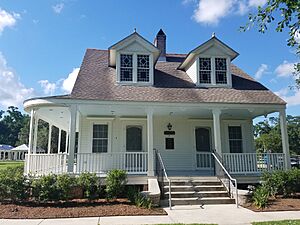
A third distinct culture in Louisiana is that of the Isleños. Its members are descendants of colonists from the Canary Islands who settled in Spanish Louisiana between 1778 and 1783 and intermarried with other communities such as Frenchmen, Acadians, Creoles, Spaniards, and other groups, mainly through the 19th and early 20th centuries.
In Louisiana, the Isleños originally settled in four communities which included Galveztown, Valenzuela, Barataria, and San Bernardo. The large migration of Acadian refugees to Bayou Lafourche led to the rapid gallicization of the Valenzuela community while the community of San Bernardo (Saint Bernard) was able to preserve much of its unique culture and language into the 21st century. The transmission of Spanish and other customs has completely halted in St. Bernard with those having competency in Spanish being octogenarians.
Through the centuries, the various Isleño communities of Louisiana have kept alive different elements of their Canary Islander heritage while also adopting and building upon the customs and traditions of the communities that surround them. Today two heritage associates exist for the communities: Los Isleños Heritage and Cultural Society of St. Bernard as well as the Canary Islanders Heritage Society of Louisiana. The Fiesta de los Isleños is celebrated annually in St. Bernard Parish which features heritage performances from local groups and the Canary Islands.
Education
Despite ranking as the third-least educated state as of 2023, preceded by Mississippi and West Virginia, Louisiana is home to over 40 public and private colleges and universities including: Louisiana State University in Baton Rouge; Louisiana Tech University in Ruston, the University of Louisiana at Lafayette in Lafayette; and Tulane University in New Orleans. Louisiana State University is the largest and most comprehensive university in Louisiana; Louisiana Tech University is one the most well regarded universities in Louisiana; the University of Louisiana at Lafayette is the second largest by enrollment. The University of Louisiana at Lafayette became an R1 university in December 2021. Tulane University is a major private research university and the wealthiest university in Louisiana with an endowment over $1.1 billion. Tulane is also highly regarded for its academics nationwide, consistently ranked in the top 50 on U.S. News & World Report's list of best national universities.
Louisiana's two oldest and largest historically black colleges and universities (HBCUs) are Southern University in Baton Rouge and Grambling State University in Grambling. Both these Southwestern Athletic Conference (SWAC) schools compete against each other in football annually in the much anticipated Bayou Classic during Thanksgiving weekend in the Superdome.
Of note among the education system, the Louisiana Science Education Act was a controversial law passed by the Louisiana Legislature on June 11, 2008, and signed into law by Governor Bobby Jindal on June 25. The act allowed public school teachers to use supplemental materials in the science classroom which are critical of established science on such topics as the theory of evolution and global warming.
In 2000, of all of the states, Louisiana had the highest percentage of students in private schools. Danielle Dreilinger of The Times Picayune wrote in 2014 that "Louisiana parents have a national reputation for favoring private schools." The number of students in enrolled in private schools in Louisiana declined by 9% from c. 2000–2005 until 2014, due to the proliferation of charter schools, the 2008 recession and Hurricane Katrina. Ten parishes in the Baton Rouge and New Orleans area had a combined 17% decline in private school enrollment in that period. This prompted private schools to lobby for school vouchers.
Louisiana's school voucher program is known as the Louisiana Scholarship Program. It was available in the New Orleans area beginning in 2008 and in the rest of the state beginning in 2012. In 2013, the number of students using school vouchers to attend private schools was 6,751, and for 2014 it was projected to exceed 8,800. As per a ruling from Ivan Lemelle, a U.S. district judge, the federal government has the right to review the charter school placements to ensure they do not further racial segregation.
Transportation
The Louisiana Department of Transportation and Development is the state government organization in charge of maintaining public transportation, roadways, bridges, canals, select levees, floodplain management, port facilities, commercial vehicles, and aviation which includes 69 airports.
Roads
Interstate highways |
United States highways
|
In 2011, Louisiana ranked among the five deadliest states for debris/litter-caused vehicle accidents per total number of registered vehicles and population size.
Rail
Six Class I freight railroads operate in Louisiana: BNSF, Canadian National, CPKC, CSX, Norfolk Southern and Union Pacific. A number of Class II and Class III railroads also carry freight.
Amtrak, the national passenger railroad, operates three long-distance rail routes through Louisiana. All three originate at New Orleans Union Passenger Terminal. The Crescent serves Slidell then runs northeast to New York via Birmingham, Atlanta, Charlotte, and Washington, D.C. The City of New Orleans stops at Hammond before continuing north to Chicago by way of Jackson and Memphis. The Sunset Limited serves Schriever, New Iberia, Lafayette, and Lake Charles on its route west to Los Angeles via Houston, San Antonio, El Paso, and Tucson. Before Hurricane Katrina, the Sunset Limited ran as far east as Orlando.
Mass transit

Predominantly serving New Orleans, the New Orleans Regional Transit Authority is the largest transit agency in the state. Other transit organizations are St. Bernard Urban Rapid Transit, Jefferson Transit, Capital Area Transit System, Lafayette Transit System, Shreveport Area Transit System, and Monroe Transit, among others.
The Louisiana Transportation Authority (under the Louisiana Department of Transportation and Development) was created in 2001 to "promote, plan, finance, develop, construct, control, regulate, operate and maintain any tollway or transitway to be constructed within its jurisdiction. Development, construction, improvement, expansion, and maintenance of an efficient, safe, and well-maintained intermodal transportation system is essential to promote Louisiana's economic growth and the ability of Louisiana's business and industry to compete in regional, national, and global markets and to provide a high quality of life for the people of Louisiana."
Air
Louis Armstrong New Orleans International Airport (MSY) is the busiest airport in Louisiana by an order of magnitude. It is also the second lowest-lying international airport in the world, at just 4.5 feet (1.4 m) above sea level. There are six other primary airports in the state: Baton Rouge Metropolitan, Shreveport Regional, Lafayette Regional, Alexandria International, Monroe Regional, and Lake Charles Regional. A total of 69 public-use airports exist in Louisiana.
Waterways

The Gulf Intracoastal Waterway is an important means of transporting commercial goods such as petroleum and petroleum products, agricultural produce, building materials and manufactured goods. In 2018, the state sued the federal government to repair erosion along the waterway.
National Guard
Louisiana has more than 9,000 soldiers in the Louisiana Army National Guard, including the 225th Engineer Brigade and the 256th Infantry Brigade. Both these units have served overseas during the War on Terror. The Louisiana Air National Guard has more than 2,000 airmen, and its 159th Fighter Wing has likewise seen combat.
Training sites in the state include Louisiana National Guard Training Center Pineville near Pineville, Camp Villere near Slidell, Camp Minden near Minden, England Air Park (formerly England Air Force Base) near Alexandria, Gillis Long Center near Carville, and Jackson Barracks in New Orleans.
Sports
Louisiana is the least populous state with more than one major professional sports league franchise: the National Basketball Association's New Orleans Pelicans and the National Football League's New Orleans Saints.
Louisiana has 12 collegiate NCAA Division I programs, a high number given its population. The state has no NCAA Division II teams and only two NCAA Division III teams. As of 2019, the LSU Tigers football team has won 12 Southeastern Conference titles, six Sugar Bowls and four national championships.
Each year New Orleans plays host to the Bayou Classic, and the New Orleans Bowl college football games, while Shreveport hosts the Independence Bowl. New Orleans has hosted the Super Bowl a record eleven times, as well as the BCS National Championship Game, NBA All-Star Game and NCAA Men's Division I Basketball Championship.
The Zurich Classic of New Orleans, is a PGA Tour golf tournament held since 1938. The Rock 'n' Roll Mardi Gras Marathon and Crescent City Classic are two road running competitions held at New Orleans.
As of 2016, Louisiana was the birthplace of the most NFL players per capita for the eighth year in a row.
Notable people
- Phil Anselmo, singer, songwriter, best known for being member of the metal band Pantera
- Terry Bradshaw, former NFL quarterback and sports personality
- James Carville, political strategist known for his success with Bill Clinton's presidential campaign
- Patricia Clarkson, actress
- Ellen DeGeneres, comedian, television host, actress, writer, and producer
- Armand Duplantis, pole vaulter. IAAF male World Athlete of the Year 2020
- Mannie Fresh; DJ, producer, and rapper
- Kevin Gates; rapper, singer, songwriter, and entrepreneur
- DJ Khaled; American DJ, record executive and media personality
- Angela Kinsey, actress
- Ali Landry, actress and Miss USA 1996
- Jared Leto, actor and musician
- Jerry Lee Lewis; singer and piano-player
- Huey Long, politician
- Peyton Manning, former American football quarterback
- Tim McGraw, singer, actor and record producer
- Tyler Perry, actor, director, producer, and screenwriter
- Dustin Poirier; American mixed martial artist, currently signed to the UFC
- Zachary Richard; Cajun singer, songwriter and poet
- Fred L. Smith Jr., founder of Competitive Enterprise Institute
- Ian Somerhalder, actor, model and director
- Britney Spears; singer, songwriter, dancer and actress
- Jamie Lynn Spears, singer and actress
- Lil Wayne; rapper, singer, songwriter, record executive, entrepreneur, and actor
- Shane West, actor, singer and songwriter
- Reese Witherspoon, actress
- YoungBoy Never Broke Again; rapper, singer, and songwriter
See also
 In Spanish: Luisiana para niños
In Spanish: Luisiana para niños




